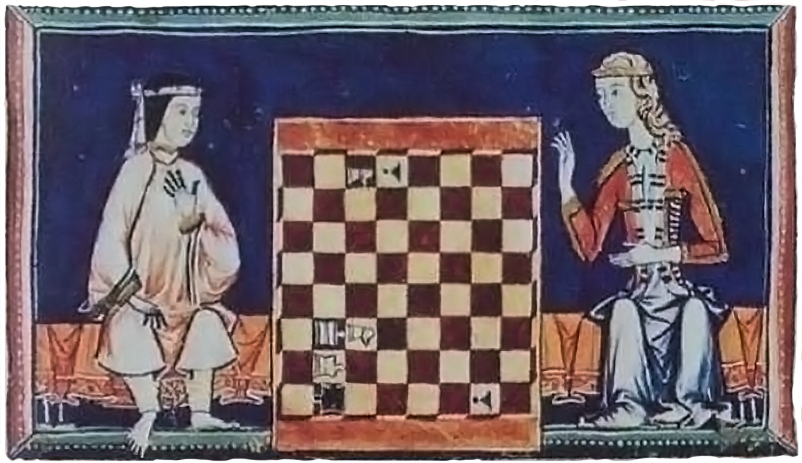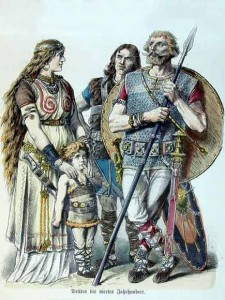
…as seen by the Romans.
A post not about an event or a story, this time, but a fascinating description.
 They choose their kings by birth, their generals for merit. These kings have not unlimited or arbitrary power, and the generals do more by example than by authority. If they are energetic, if they are conspicuous, if they fight in the front, they lead because they are admired. But to reprimand, to imprison, even to flog, is permitted to the priests alone, and that not as a punishment, or at the general’s bidding, but, as it were, by the mandate of the god whom they believe to inspire the warrior. They also carry with them into battle certain figures and images taken from their sacred groves. And what most stimulates their courage is, that their squadrons or battalions, instead of being formed by chance or by a fortuitous gathering, are composed of families and clans. Close by them, too, are those dearest to them, so that they hear the shrieks of women, the cries of infants. They are to every man the most sacred witnesses of his bravery-they are his most generous applauders. The soldier brings his wounds to mother and wife, who shrink not from counting or even demanding them and who administer food and encouragement to the combatants.
They choose their kings by birth, their generals for merit. These kings have not unlimited or arbitrary power, and the generals do more by example than by authority. If they are energetic, if they are conspicuous, if they fight in the front, they lead because they are admired. But to reprimand, to imprison, even to flog, is permitted to the priests alone, and that not as a punishment, or at the general’s bidding, but, as it were, by the mandate of the god whom they believe to inspire the warrior. They also carry with them into battle certain figures and images taken from their sacred groves. And what most stimulates their courage is, that their squadrons or battalions, instead of being formed by chance or by a fortuitous gathering, are composed of families and clans. Close by them, too, are those dearest to them, so that they hear the shrieks of women, the cries of infants. They are to every man the most sacred witnesses of his bravery-they are his most generous applauders. The soldier brings his wounds to mother and wife, who shrink not from counting or even demanding them and who administer food and encouragement to the combatants.
Tradition says that armies already wavering and giving way have been rallied by women who, with earnest entreaties and bosoms laid bare, have vividly represented the horrors of captivity, which the Germans fear with such extreme dread on behalf of their women, that the strongest tie by which a state can be bound is the being required to give, among the number of hostages, maidens of noble birth. They even believe that the sex has a certain sanctity and prescience, and they do not despise their counsels, or make light of their answers. In Vespasian’s days we saw Veleda, long regarded by many as a divinity. In former times, too, they venerated Aurinia, and many other women, but not with servile flatteries, or with sham deification.1
1Tacitus, The Agricola and Germania, A. J. Church and W. J. Brodribb, trans., (London: Macmillan, 1877), pp. 87ff
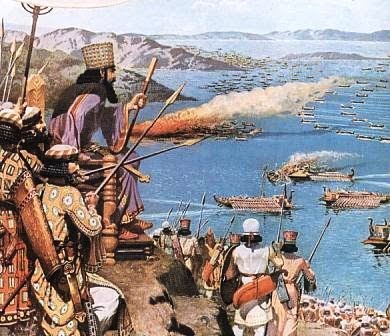
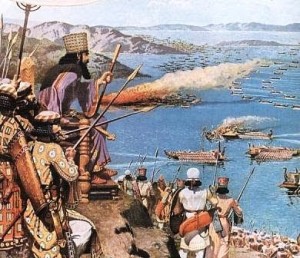 Artemisia I of Caria (fl. 480 BC) became the ruler, after the death of her husband, as a client of the Persians – who in the 5th century BC ruled as the overlords of Ionia.
Artemisia I of Caria (fl. 480 BC) became the ruler, after the death of her husband, as a client of the Persians – who in the 5th century BC ruled as the overlords of Ionia.
The Battle of Salamis was fought between an Alliance of Greek city-states and the Persian Empire in September 480 BC in the straits between the mainland and Salamis, an island in the Saronic Gulf near Athens. It marked the high-point of the second Persian invasion of Greece which had begun in 480 BC.
Although heavily outnumbered, the Greek Allies were persuaded by the Athenian general Themistocles to bring the Persian fleet to battle, in the hope that a victory would prevent naval operations against the Peloponessus. The Persian king Xerxes was also anxious for a decisive battle. As a result of subterfuge on the part of Themistocles, the Persian navy sailed into the Straits of Salamis and tried to block both entrances. In the cramped conditions of the Straits the great Persian numbers were an active hindrance, as ships struggled to manoeuvre and became disorganised. Seizing the opportunity, the Greek fleet formed in line and scored a decisive victory, sinking or capturing at least 300 Persian ships.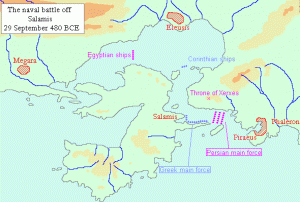
As a result Xerxes retreated to Asia with much of his army, leaving Mardonius to complete the conquest of Greece. However, the following year, the remainder of the Persian army was decisively beaten at the Battle of Plataea and the Persian navy at the Battle of Mycale. Afterwards the Persian made no more attempts to conquer the Greek mainland. These battles of Salamis and Plataea thus mark a turning point in the course of the Greco-Persian wars as a whole; from then onward, the Greek poleis would take the offensive.
Xerxes ordered a throne to be set up on the slopes of Mount Aigaleo (overlooking the straits), in order to watch the battle from a clear vantage point, and so as to record the names of commanders who performed particularly well.
Source.
7. 99 I see no need to mention any of the other captains except Artemisia. I find it a great marvel that a woman went on the expedition against Hellas: after her husband died, she took over his tyranny, though she had a young son, and followed the army from youthful spirits and manliness, under no compulsion. Artemisia was her name, and she was the daughter of Lygdamis; on her father’s side she was of Halicarnassian lineage, and on her mother’s Cretan. She was the leader of the men of Halicarnassus and Cos and Nisyrus and Calydnos, and provided five ships. Her ships were reputed to be the best in the whole fleet after the ships of Sidon, and she gave the king the best advice of all his allies.
8. 67 …[Xerxes] came and sat on his throne, and present at his summons were the tyrants of all the peoples and the company leaders from the fleet. They sat according to the honor which the king had granted each of them, first the king of Sidon, then the king of Tyre, then the rest. When they sat in order one after another, Xerxes sent Mardonius to test each by asking if they should fight at sea.
8. 68 Mardonius went about questioning them, starting with the Sidonian, and all the others were unanimous, advising to fight at sea, but Artemisia said, “Tell the king, Mardonius, that I, who neither was most cowardly in the sea battles off Euboea nor performed the least feats of arms, say this: ‘Master, it is just for me to declare my real opinion, what I consider to be best for your cause. And I say to you this: spare your ships, and do not fight at sea. Their men are as much stronger than your men by sea as men are stronger than women. Why is it so necessary for you to risk everything by fighting at sea? Do you not possess Athens, for which you set out on this march, and do you not have the rest of Hellas? No one stands in your way. Those who opposed you have received what they deserved. I will tell you how I think the affairs of your enemies will turn out: If you do not hurry to fight at sea, but keep your ships here and stay near land, or even advance into the Peloponnese, then, my lord, you will easily accomplish what you had in mind on coming here. The Hellenes are not able to hold out against you for a long time, but you will scatter them, and they will each flee to their own cities. I have learned that they have no food on this island, and it is not likely, if you lead your army against the Peloponnese, that those of them who have come from there will sit still, nor will they care to fight at sea for Athens. But if you hurry to fight at sea immediately, I fear that your fleet if reduced to cowardice may also injure your army on land. In addition, my King, take this to heart: Good people’s slaves tend to be base, and the slaves of the base tend to be good. You, who are best among men, have base slaves, who are accounted your allies, the Egyptians and Cyprians and Cilicians and Pamphylians, who are of no use at all.’”
8. 69 When she said this to Mardonius, all who were well disposed towards Artemisia lamented her words, thinking she would suffer some ill from the king because she advised against fighting at sea. Those who were jealous and envied her, because she was given honor among the chief of all the allies, were glad at her answer, thinking she would be killed. But when the counsels were reported to Xerxes, he was greatly pleased by Artemisia’s opinion. Even before this he had considered her of excellent character, and now he praised her much more highly. Still he ordered that the majority be obeyed, for he believed that at Euboea they had purposely fought badly because he was not there. This time he had made preparations to see the battle in person.
8. 87 I cannot say exactly how each of the other barbarians or Hellenes fought, but this is what happened to Artemisia, and it gave her still higher esteem with the king: When the king’s side was all in commotion, at that time Artemisia’s ship was pursued by a ship of Attica. She could not escape, for other allied ships were in front of her and hers was the nearest to the enemy. So she resolved to do something which did in fact benefit her: as she was pursued by the Attic ship, she charged and rammed an allied ship, with a Calyndian crew and Damasithymus himself, king of the Calyndians, aboard. I cannot say if she had some quarrel with him while they were still at the Hellespont, or whether she did this intentionally or if the ship of the Calyndians fell in her path by chance. But when she rammed and sank it, she had the luck of gaining two advantages. When the captain of the Attic ship saw her ram a ship with a barbarian crew, he decided that Artemisia’s ship was either Hellenic or a deserter from the barbarians fighting for them, so he turned away to deal with others.
8. 88 Thus she happened to escape and not be destroyed, and it also turned out that the harmful thing which she had done won her exceptional esteem from Xerxes. It is said that the king, as he watched the battle, saw her ship ram the other, and one of the bystanders said, “Master, do you see how well Artemisia contends in the contest and how she has sunk an enemy ship?” When he asked if the deed was truly Artemisia’s, they affirmed it, knowing reliably the marking of her ship, and they supposed that the ruined ship was an enemy. As I have said, all this happened to bring her luck, and also that no one from the Calyndian ship survived to accuse her. It is said that Xerxes replied to what was told him, “My men have become women, and my women men.” They say this is what Xerxes said.
8. 89 In this struggle the general Ariabignes died, son of Darius and the brother of Xerxes. Many other famous men of the Persians and Medes and other allies also died, but only a few Hellenes, since they knew how to swim. Those whose ships were sunk swam across to Salamis, unless they were killed in action, but many of the barbarians drowned in the sea since they did not know how to swim. Most of the ships were sunk when those in the front turned to flee, since those marshalled in the rear, as they tried to go forward with their ships so they too could display some feat to the king, ran afoul of their own side’s ships in flight.
8. 91 The barbarians were routed and tried to flee by sailing out to Phalerum, but the Aeginetans lay in wait for them in the strait and then performed deeds worth telling. The Athenians in the commotion destroyed those ships which either resisted or tried to flee, the Aeginetans those sailing out of the strait. Whoever escaped from the Athenians charged right into the Aeginetans.
8. 93 In this battle the Hellenes with the reputation as most courageous were the Aeginetans, then the Athenians. Among individuals they were Polycritus the Aeginetan and the Athenians Eumenes of Anagyrus and Aminias of Pallene, the one who pursued Artemisia. If he had known she was in that ship, he would not have stopped before either capturing it or being captured himself. Such were the orders given to the Athenian captains, and there was a prize offered of ten thousand drachmas to whoever took her alive, since they were indignant that a woman waged war against Athens. But she escaped, as I said earlier, and the others whose ships survived were also in Phalerum.
8. 101 When [Xerxes] consulted with those Persians whom he summoned, he resolved to send for Artemisia as well, because he saw that she alone at the former sitting had discerned what was best to do. When Artemisia came, Xerxes bade all others withdraw, both Persian councillors and guards, and said to her: “It is Mardonius’s advice that I should follow here and attack the Peloponnese, for the Persians, he says, and the land army are not to blame for our disaster; of that they would willingly give proof. Therefore he advises me to do this, or else he offers to choose three hundred thousand men of the army and deliver Hellas to me enslaved, while I myself by his counsel march homeward with the rest of the host. Now I ask of you, seeing that you correctly advised me against the late sea-fight, counsel me as to which of these two things would be best for me to do.”
8. 102 When she was asked for advice, she replied: “It is difficult, O king, to answer your plea for advice by saying that which is best, but in the present turn of affairs I think it best that you march back and that Mardonius, if he so wishes and promises to do as he says, be left here with those whom he desires. For if he subdues all that he offers to subdue and prospers in his design, the achievement, Sire, is yours since it will be your servants who have accomplished it. If, on the other hand, the issue is contrary to Mardonius’s expectation, it is no great misfortune so long as you and all that household of yours are safe; for while you and the members of your household are safe, many a time will the Greeks have to fight for their lives. As for Mardonius, if any disaster befalls him, it is does not much matter, nor will any victory of the Greeks be a real victory when they have but slain your servant. As for you, you will be marching home after the burning of Athens, which thing was the whole purpose of your expedition.”
8. 103 Artemisia’s counsel pleased Xerxes, for it happened that she spoke what he himself had in mind. In truth, I think that he would not have remained even if all men and women had counselled him so to do—so panic-stricken was he. Having then thanked Artemisia, he sent her away to take his sons to Ephesus, for he had some bastard sons with him.
Herodotus, Histories, with an English translation by A. D. Godley. Cambridge. Harvard University Press. 1920.


Bust of Tiberius. (Photo by Chris Nyborg)
Tiberius (Tiberius Julius Caesar Augustus), November 16, 42 BC – March 16, AD 37, was the 2nd Emperor of the Roman Empire, and reigned from 14 AD to 37 AD.
He was, moreover, quite unperturbed by abuse, slander, or lampoons on himself and his family, and would often say that liberty to speak and think as one pleases is the test of a free country. When the Senate asked that those who had offended in this way should be brought to book, he replied: ‘We cannot spare the time to undertake any such new enterprise. Open that window, and you will let in such a rush of denunciations as to waste your whole working day; everyone will take this opportunity of airing some private feud.’ A remarkably modest statement of his is recorded in the Proceedings of the Senate: ‘If So-and-so challenges me, I shall lay before you a careful account of what I have said and done; if that does not satisfy him, I shall reciprocate his dislike of me.’1
1 Suetonius, The Twelve Caesars, trans. Robert Graves, London: The Folio Society, 1964, pp. 126.
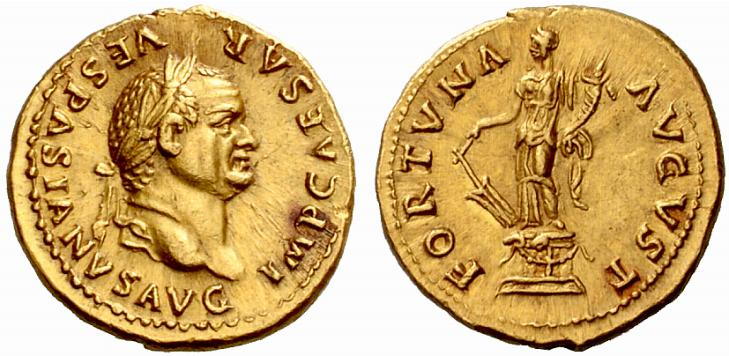

Roman aureus depicting Vespasian as Emperor. The reverse shows the Goddess Fortuna.
Vespasian was square-shouldered, with strong, well-formed limbs, but always wore a strained expression on his face; so that once, when he asked a well-known wit who always used to make jokes about people: ‘Why not make one about me?’ the answer came:
‘I will, when you have at last finished relieving yourself.’
… Yet Vespasian was nearly always just as good-natured, cracking frequent jokes; and, though he had a low form of humour and often used obscene expressions, some of his sayings are still remembered. Taken to task by Mestrius Florus, an ex-consul, for vulgarly saying plostra instead of plaustra (waggons), he greeted him the following day as ‘Flaurus’. Once a woman complained that she was desperately in love with him, and would not leave him alone until he consented to seduce her.
‘How shall I enter that item in your expense ledger?’ asked his accountant later, on learning that she had got 4,000 gold pieces out of him.
‘Oh,’ said Vespasian, ‘just put it down to “love for Vespasian”.’
With his knack of apt quotation from the Greek Classics, he once described a very tall man whose genitals were grotesquely over-developed as:
Striding along with a lance which casts a preposterous shadow,
– a line out of the Iliad. And when, to avoid paying death duties into the Privy Purse, a very rich freedman changed his name and announced that he had been born free, Vespasian quoted Menander’s :
O, Laches, when you life is o’er,
Cerylus you will be once more.
Most of his humour, however, centred on the way he did business; he always tried to make his swindles sound less offensive by passing them off as jokes. One of his favourite servants applied for a stewardship on behalf of a man whose brother he claimed to be.
‘Wait,’ Vespasian told him, and had the candidate brought in for a private interview.
‘How much commission would you have paid my servant?’ he asked. The man mentioned a sum. ‘You may pay it directly to me,’ said Vespasian, giving him the stewardship. When the servant brought the matter up again, Vespasian’s advice was:
‘Go and find another brother. The one you mistook for your own turns out to be mine!’
Once, on a journey, his muleteer dismounted and began shoeing the mules; Vespasian suspected a ruse to hold him up, because a friend of the muleteer’s had appeared and was now busily discussing a law-suit. Vespasian made the muleteer tell him just what his shoeing fee would be; and insisted on being paid half [of it]. Titus [Vespasian’s son] complained about the tax which Vespasian had imposed on the contents of the City urinals (used by the fullers to clean woollens). Vespasian handed him a coin which had been part of the first day’s proceeds:
‘Does it smell bad, son?’ he asked.
‘No, father!’
‘That’s odd: it comes straight from the urinal!’
When a deputation from the Senate reported that a huge and expensive statue had been voted him at public expense, Vespasian held out his hand, with:
‘The pedestal is waiting.’
Nothing could stop this flow of humour, even the fear of imminent death. Among the many portents of his end was a yawning crevice in August’s Mausoleaum.
‘That will be for Junia Calvina,’ he said, ‘she is one of his descendants.’
And at the fatal sight of a comet he cried:
‘Look at that long hair! The King of Parthia must be going to die.’
His death-bed joke was:
‘Dear me! I must be turning into a god.’1
1 Suetonius, The Twelve Caesars, trans. Robert Graves, London: The Folio Society, 1964, pp. 291-293.


A marble bust of Caligula restored to its original colours. The colours were identified from particles trapped in the marble. (Photo by Marsyas)
Caligula had only a single taste of warfare, and even that was unpremeditated. At Bevagna, where he went to visit the river Clitumnus and its sacred grove, someone reminded him that he needed Batavian recruits for his bodyguard; which suggested the idea of a German expedition. He wasted no time in summoning regular legions and auxiliaries from all directions, levied troops with the utmost strictness, and collected military supplies on an unprecedented scale. Then he marched off with such rapidity that the Guards battalions could not keep up with him except by breaking tradition: they had to tie their standards on the pack-mules. Yet, later, he became so lazy and self-indulgent that he travelled in a litter borne by eight bearers; and, whenever he approached a town, made the inhabitants sweep the roads and lay the dust with sprinklers.
After reaching his headquarters, Caligula showed how keen and severe a commander-in-chief he intended to be by ignominiously dismissing any general who was late in bringing along the auxiliaries he required. Then, when he reviewed the legions, he discharged several veteran leading-centurions on grounds of age and incapacity, though some had only a few more days of their service to run; and, calling the remainder a pack of greedy fellows, scaled down their retirement bonus to sixty gold pieces each.
All that he accomplished in this expedition was to receive the surrender of Adminius, son of the British King Cymbeline, who had been banished by his father and come over to the Romans with a few followers. Caligula, nevertheless, wrote an extravagant despatch, which might have persuaded any reader that the whole island had surrendered to him, and ordered the couriers not to dismount from their post-chaise on reaching the outskirts of Rome – although wheeled traffic was forbidden in the streets during daylight hours – but make straight for the Forum and the Senate House, and take his letter to the Temple of Mars for personal delivery to the Consuls, in the presence of the entire Senate.
Since the chance of military action appeared very remote, he presently sent a few of his German bodyguard across the Rhine, with orders to hide among the trees. After luncheon scouts hurried in to tell him excitedly that the enemy were upon him. He at once galloped out, at the head of his staff and a few Guards cavalry, to halt in the nearest thicket, where they chopped branches from the trees and dressed them like trophies; then, riding back by torchlight, he taunted as cowards all who had failed to follow him, and awarded his fellow-heroes a novel fashion in crowns – he called it ‘The Ranger’s Crown’ — ornamented with sun, moon, and stars. On another day he took some German hostages from a military school, where they were being taught the rudiments of Latin, and secretly ordered them on ahead of him. Later, he left his dinner in a hurry and took his cavalry in pursuit of them, as though they had been fugitives. He was no less melodramatic about this foray: when he returned to the hall after catching the hostages and bringing them back in irons, and his officers reported that the army was marshalled, he made them recline at table, still in their corselets, and quoted Virgil’s famous advice: ‘Be steadfast, comrades, and preserve yourselves for happier occasions!’ He also severely reprimanded the absent Senate and People for enjoying banquets and festivities, and for hanging about the theatres or their luxurious country-houses while the Emperor was exposed to all the hazards of war.
In the end, he drew up his army in battle array facing the Channel and moved the siege-engines into position as though he intended to bring the campaign to a close. No one had the least notion what was in his mind when, suddenly, he gave the order: ‘Gather sea-shells!’
He referred to the shells as ‘plunder from the sea, due to the Capitol and to the Palace’, and made the troops fill their helmets and tunic-laps with them; commemorating this victory by the erection of a tall lighthouse, not unlike the one at Pharos, in which fires were to be kept going all night as a guide to ships. Then he promised every soldier a bounty of four gold pieces, and told them: ‘Go rich, go happy!’ as though he had been excessively generous.
He now concentrated his attention on the imminent triumph. To supplement the few prisoners taken in frontier skirmishes and the deserters who had come over from the barbarians, he picked the tallest Gauls of the province – ‘those worthy of a triumph’ – and some of their chiefs as well, for his supposed train of captives. These had not only to grow their hair and dye it red, but also to learn German and adopt German names. The triremes used in the Channel were carted overland most of the way; and he sent a letter ahead instructing his agents to prepare a triumph more lavish than any hitherto known, but at the least possible expense to the Privy Purse; and added that everyone’s property was at their disposal.
Before leaving Gaul he planned, in a sudden access of cruelty, to massacre the legionaries who, at news of Augustus’s death, had mutinously besieged his father Germanicus’s headquarters; he had been there himself as a little child. His friends barely restrained him from carrying this plan out, and he could not be dissuaded from ordering the execution of every tenth man; for which purpose they had to parade without swords or javelins, and surrounded by armed horsemen. But when he noticed that a number of legionaries, scenting trouble, were slipping away to fetch their weapons, he hurriedly absconded and headed straight for Rome.1
1 Suetonius, The Twelve Caesars, trans. Robert Graves, London: The Folio Society, 1964, pp. 172-174.

 They choose their kings by birth, their generals for merit. These kings have not unlimited or arbitrary power, and the generals do more by example than by authority. If they are energetic, if they are conspicuous, if they fight in the front, they lead because they are admired. But to reprimand, to imprison, even to flog, is permitted to the priests alone, and that not as a punishment, or at the general’s bidding, but, as it were, by the mandate of the god whom they believe to inspire the warrior. They also carry with them into battle certain figures and images taken from their sacred groves. And what most stimulates their courage is, that their squadrons or battalions, instead of being formed by chance or by a fortuitous gathering, are composed of families and clans. Close by them, too, are those dearest to them, so that they hear the shrieks of women, the cries of infants. They are to every man the most sacred witnesses of his bravery-they are his most generous applauders. The soldier brings his wounds to mother and wife, who shrink not from counting or even demanding them and who administer food and encouragement to the combatants.
They choose their kings by birth, their generals for merit. These kings have not unlimited or arbitrary power, and the generals do more by example than by authority. If they are energetic, if they are conspicuous, if they fight in the front, they lead because they are admired. But to reprimand, to imprison, even to flog, is permitted to the priests alone, and that not as a punishment, or at the general’s bidding, but, as it were, by the mandate of the god whom they believe to inspire the warrior. They also carry with them into battle certain figures and images taken from their sacred groves. And what most stimulates their courage is, that their squadrons or battalions, instead of being formed by chance or by a fortuitous gathering, are composed of families and clans. Close by them, too, are those dearest to them, so that they hear the shrieks of women, the cries of infants. They are to every man the most sacred witnesses of his bravery-they are his most generous applauders. The soldier brings his wounds to mother and wife, who shrink not from counting or even demanding them and who administer food and encouragement to the combatants.







